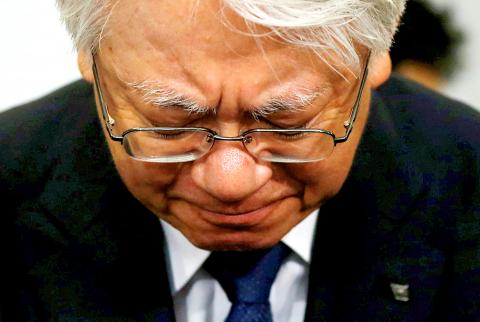Kobe Steel Ltd chief executive officer Hiroya Kawasaki yesterday said the firm’s data fabrication may have spread beyond Japan, as he was ordered by the government to report on how the misconduct occurred and address safety concerns that have sparked a scare along global supply chains.
“The credibility of Kobe Steel has plunged to zero. We will make efforts to regain trust as soon as possible,” Kawasaki, 63, told reporters after meeting with government officials.
A senior government official said managers at Kobe Steel were involved in fabricating data on products used in planes, trains and automobiles.

Photo: REUTERS
However, Kawasaki said his current priority is to deal with safety checks with its clients.
The company has found possible further cases of tampering, Kawasaki said, including in overseas operations.
The Japanese Ministry of Economy, Trade and Industry ordered Kobe Steel to report on the results of safety checks within about two weeks and the reasons for the tampering, along with prevention measures in under a month.
Kawasaki was not expecting to see recalls of cars or airplanes for now and none of the company’s customers have cancelled orders, he said, adding that Kobe Steel has no plans to sell assets at the moment.
In the US, General Motors Co (GM) the latest major automaker to be dragged into the widening scandal, said it is checking whether its cars contain falsely certified parts or components sourced from Kobe Steel.
“General Motors is aware of the reports of material deviation in Kobe Steel copper and aluminum products,” spokesman Nick Richards said. “We are investigating any potential impact and do not have any additional comments at this time.”
GM joins automakers including Toyota Motor Corp and as many as 200 other companies that have received parts sourced from Kobe Steel.
The steelmaker on Saturday said it had falsified data about the quality of aluminum and copper products used in cars, aircraft, space rockets and defense equipment.
Late on Wednesday it said it had found 70 cases of tampering with data on materials used in optical disks and liquid crystal displays at its Kobelco Research Institute Inc, which makes and tests products for the company.

CAUTIOUS RECOVERY: While the manufacturing sector returned to growth amid the US-China trade truce, firms remain wary as uncertainty clouds the outlook, the CIER said The local manufacturing sector returned to expansion last month, as the official purchasing managers’ index (PMI) rose 2.1 points to 51.0, driven by a temporary easing in US-China trade tensions, the Chung-Hua Institution for Economic Research (CIER, 中華經濟研究院) said yesterday. The PMI gauges the health of the manufacturing industry, with readings above 50 indicating expansion and those below 50 signaling contraction. “Firms are not as pessimistic as they were in April, but they remain far from optimistic,” CIER president Lien Hsien-ming (連賢明) said at a news conference. The full impact of US tariff decisions is unlikely to become clear until later this month

GROWING CONCERN: Some senior Trump administration officials opposed the UAE expansion over fears that another TSMC project could jeopardize its US investment Taiwan Semiconductor Manufacturing Co (TSMC, 台積電) is evaluating building an advanced production facility in the United Arab Emirates (UAE) and has discussed the possibility with officials in US President Donald Trump’s administration, people familiar with the matter said, in a potentially major bet on the Middle East that would only come to fruition with Washington’s approval. The company has had multiple meetings in the past few months with US Special Envoy to the Middle East Steve Witkoff and officials from MGX, an influential investment vehicle overseen by the UAE president’s brother, the people said. The conversations are a continuation of talks that

CHIP DUTIES: TSMC said it voiced its concerns to Washington about tariffs, telling the US commerce department that it wants ‘fair treatment’ to protect its competitiveness Taiwan Semiconductor Manufacturing Co (TSMC, 台積電) yesterday reiterated robust business prospects for this year as strong artificial intelligence (AI) chip demand from Nvidia Corp and other customers would absorb the impacts of US tariffs. “The impact of tariffs would be indirect, as the custom tax is the importers’ responsibility, not the exporters,” TSMC chairman and chief executive officer C.C. Wei (魏哲家) said at the chipmaker’s annual shareholders’ meeting in Hsinchu City. TSMC’s business could be affected if people become reluctant to buy electronics due to inflated prices, Wei said. In addition, the chipmaker has voiced its concern to the US Department of Commerce

STILL LOADED: Last year’s richest person, Quanta Computer Inc chairman Barry Lam, dropped to second place despite an 8 percent increase in his wealth to US$12.6 billion Staff writer, with CNA Daniel Tsai (蔡明忠) and Richard Tsai (蔡明興), the brothers who run Fubon Group (富邦集團), topped the Forbes list of Taiwan’s 50 richest people this year, released on Wednesday in New York. The magazine said that a stronger New Taiwan dollar pushed the combined wealth of Taiwan’s 50 richest people up 13 percent, from US$174 billion to US$197 billion, with 36 of the people on the list seeing their wealth increase. That came as Taiwan’s economy grew 4.6 percent last year, its fastest pace in three years, driven by the strong performance of the semiconductor industry, the magazine said. The Tsai